|
Books Should Be Free Loyal Books Free Public Domain Audiobooks & eBook Downloads |
|
|
Books Should Be Free Loyal Books Free Public Domain Audiobooks & eBook Downloads |
|
Satires |
|---|
|
Book type:
Sort by:
View by:
|
By: Gaius Petronius Arbiter | |
|---|---|
 The Satyricon
The Satyricon
Satyricon (or Satyrica) is a Latin work of fiction in a mixture of prose and poetry. It is believed to have been written by Gaius Petronius, though the manuscript tradition identifies the author as a certain Titus Petronius. As with the Metamorphoses of Apuleius, classical scholars often describe it as a "Roman novel", without necessarily implying continuity with the modern literary form.The surviving portions of the text detail the misadventures of the narrator, Encolpius, and his lover, a handsome sixteen-year-old boy named Giton... | |
By: George Barr McCutcheon (1866-1928) | |
|---|---|
 Yollop
Yollop
Mr. Crittenden Yollop makes friends with the man who came to burglarize his home and sets out to help him return to where he really wants to be...prison. This humorous satire takes a somewhat different look at prisons, criminals, the law and reformers. | |
By: George Bernard Shaw (1856-1950) | |
|---|---|
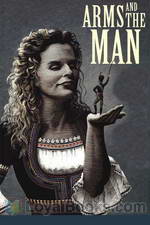 Arms and the Man
Arms and the Man
Arms and the Man is a comedy by George Bernard Shaw that takes place in 1885, during the Serbo-Bulgarian War. Raina Petkoff is engaged to the gallant Sergius Saranoff, hero of the recent Bulgarian victory over the Serbs. But she is distracted by the abrupt arrival of Captain Bluntschli, a Swiss mercenary who fought for the Serbian army. He takes refuge in her bedroom after the battle and although he is initially threatening, reveals that he carries chocolates instead of bullets. Will Raina marry the posturing Sergius or the chocolate cream soldier? Extra intrigue is provided by saucy servant girl Louka, her dour fiance Nicola, and Raina's hand-wringing parents. | |
 Mrs. Warren's Profession
Mrs. Warren's Profession
The story centers on the relationship between Mrs Kitty Warren, a rich woman, described by the author as "on the whole, a genial and fairly presentable old blackguard of a woman" and her daughter, Vivie. Mrs Warren is a middle-aged woman whose Cambridge-educated daughter, Vivie, is horrified to discover the morally questionable way her mother acquired her fortune. | |
 Candida
Candida
Candida, a comedy by playwright George Bernard Shaw, was first published in 1898, as part of his Plays Pleasant. The central characters are clergyman James Morell, his wife Candida and a youthful poet, Eugene Marchbanks, who tries to win Candida's affections. The play questions Victorian notions of love and marriage, asking what a woman really desires from her husband. The cleric is a Fabian Socialist, allowing Shaw—himself a Fabian—to weave political issues, current at the time, into the story. | |
 Widowers' Houses
Widowers' Houses
This is one of three plays Shaw published as Plays Unpleasant in 1898; they were termed "unpleasant" because they were intended, not to entertain their audiences—as traditional Victorian theatre was expected to—but to raise awareness of social problems and to censure exploitation of the laboring class by the unproductive rich. In this play, Dr. Harry Trench becomes disillusioned when he discovers how his fiancee's father, Mr. Sartorius, makes his money. However, it is soon revealed that Trench's own income is far from untainted. | |
By: George Gascoigne (1535-1577) | |
|---|---|
 Adventures of Master F.J.
Adventures of Master F.J.
This story presents through letters, poems and third-person commentary the love affair between a young man named Freeman Jones and a married woman named Elinor, lady of the castle he is visiting in Scotland. Events in the affair are traced from initial attraction through seduction to (somewhat) graphic sexual encounters and their aftermath. (Allegedly based on a real-life scandal, the author, in re-issuing his story two years later, transplanted the action to Italy, renaming the principals Fernando Jeronimi and Leonora.) | |
By: Godfrey Sweven (1845-1935) | |
|---|---|
 Riallaro: The Archipelago of Exiles
Riallaro: The Archipelago of Exiles
John Macmillan Brown was born in New Zealand and a University professor, wrote under the pseudonym Godfrey Sweven. An excerpt from the Introduction: "Absorbed in contemplation of its sublimity, I sat for a moment on a rock that rose out of the bush. I almost leapt from it, startled; a voice, unheralded, fell like a falling star through the soundless air. I had heard no footstep, no snap of trodden twig or rustle Of reluctant branch. My senses were so thrilled with the sound that its purport shot past them. There at the base of the rock stood the strangest figure that ever met my eyes." - Summary by Kirk202 | |
By: H. G. Wells (1866-1946) | |
|---|---|
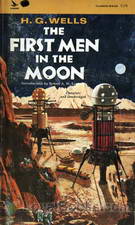 The First Men in the Moon
The First Men in the Moon
Written nearly seven decades before Neil Armstrong's historic “Giant leap for Mankind” this book by one of the most influential sci-fi writers in English is an interesting read. The First Men in the Moon by Herbert George Wells, the English author who is today called the Father of Science Fiction, describes a strange and fantastic voyage. Businessman and budding playwright, John Bedford takes a sabbatical from his work and decides to write a play. He moves to a lonely cottage in Kent where he hopes to come up with a theatrical masterpiece... | |
 Love and Mr Lewisham
Love and Mr Lewisham
The teaching profession, science and politics in late 19th century England. H.G.Wells’ humorous early novel, drawing on his own life, shows how these – as well as involvement in spiritualism – have to compete with love. | |
 Wonderful Visit
Wonderful Visit
An other-worldly creature visits a small English village, and H. G. Wells uses humour and satire to convey some of the imperfections of Victorian society, as ‘angel’ and humans view each other with equal incomprehension.( | |
 Joan and Peter
Joan and Peter
This is satirical look at the English educational system and society in the early twentieth century and the effect of World War I on them by following the lives of Peter Stublands and the orphaned Joan. It is a sad indictment, and Wells includes "An Apology of a Schoolmaster" to explain the constraints of the system. | |
By: Henry Fielding (1707-1754) | |
|---|---|
 Journey from this World to the Next
Journey from this World to the Next
The narrator dies in the first sentence. Through relating his travels in the afterlife, Henry Fielding, author of Tom Jones and Joseph Andrews, gently satirizes life here on earth. | |
 The History of the Life of the Late Mr. Jonathan Wild the Great
The History of the Life of the Late Mr. Jonathan Wild the Great
This novel is sometimes thought of as [Fielding's] first because he almost certainly began composing it before he wrote Shamela and Joseph Andrews. It is a satire of Walpole that draws a parallel between Walpole and Jonathan Wild, the infamous gang leader and highwayman. He implicitly compares the Whig party in Parliament with a gang of thieves being run by Walpole, whose constant desire to be a “Great Man” (a common epithet for Walpole) should culminate only in the antithesis of greatness: being hanged. | |
 An Apology for the Life of Mrs. Shamela Andrews
An Apology for the Life of Mrs. Shamela Andrews
An Apology for the Life of Mrs. Shamela Andrews, or simply Shamela, as it is more commonly known, is a satirical novel written by Henry Fielding and first published in April 1741 under the name of Mr. Conny Keyber. Fielding never owned to writing the work, but it is widely considered to be his. It is a direct attack on the then-popular novel Pamela (November 1740) by Fielding's contemporary and rival Samuel Richardson and is composed, like Pamela, in epistolary form. Shamela is written as a shocking revelation of the true events which took place in the life of Pamela Andrews, the main heroine of Pamela... | |
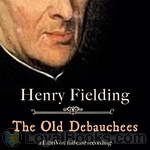 The Old Debauchees
The Old Debauchees
Young Laroon plans to marry Isabel, but Father Martin manipulates Isabel's father, Jourdain, in order to seduce Isabel. However, other characters, including both of the Laroons, try to manipulate Jourdain for their own ends; they accomplish it through disguising themselves as priests and using his guilt to convince him of what they say. As Father Martin pursues Isabel, she is clever enough to realize what is happening and plans her own trap. After catching him and exposing his lust, Father Martin is set to be punished. | |
 Life and Death of Tom Thumb the Great
Life and Death of Tom Thumb the Great
Tom Thumb, small of stature, great of heart. This play was written as a parody of the tragic heroic biography of a great man, filled with biting satire as to people and events of the time. Note as warned by the title that this is not a happy-ending fairy tale. Supposedly Jane Austen put on a family performance of this play. - Summary by ToddHW Cast list: King Arthur, a passionate sort of king, husband to queen Dollallolla, of whom he stands a little in fear; father to Huncamunca, whom he is... | |
 Author's Farce
Author's Farce
Henry Fielding could not write plays that he could get published. So he decided to write a play - a farce - about that, and success was his at last. The third act of the play is the play that the Author in the play supposedly writes - a Puppet Show called The Pleasures of the Town. - Summary by ToddHW Cast list: Luckless, the Author and Master of the Show: Adrian Stephens Witmore, his friend: Greg Giordano Marplay Senior, Comedian: Alan Mapstone Marplay Junior, Comedian: Availle Bookweight,... | |
 Don Quixote in England
Don Quixote in England
"The Audience, I believe, are all acquainted with the Character of Don Quixote and Sancho. I have brought them over into England, and introduced them at an Inn in the Country, where, I believe, no one will be surpris'd that the Knight finds several People as mad as himself." - Summary by Author Cast list: Don Quixote: ToddHW Sancho: Alan Mapstone Sir Thomas Loveland: Ron Altman Squire Badger: Adrian Stephens Scut, his Huntsman: Joanna Michal Hoyt Fairlove: Larry Wilson Mayor: Greg Giordano Retail: Sandra Schmit Guzzle: Mike Manolakes John: Jaime Kurzweg Brief, a Lawyer: panelbeaterva Dr... | |
By: Henry L. Mencken | |
|---|---|
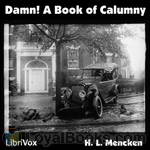 Damn! A Book of Calumny
Damn! A Book of Calumny
Henry Louis “H. L.” Mencken (1880 – 1956) was an American journalist, essayist, magazine editor, satirist, acerbic critic of American life and culture, and a student of American English. Known as the “Sage of Baltimore”, he is regarded as one of the most influential American writers and prose stylists of the first half of the 20th century. Mencken is perhaps best remembered today for The American Language, a multi-volume study of how the English language is spoken in the United States, and for his satirical reporting on the Scopes trial, which he named the “Monkey” trial.” | |
By: Herbert George Jenkins (1876-1923) | |
|---|---|
 John Dene of Toronto; a Comedy of Whitehall
John Dene of Toronto; a Comedy of Whitehall
John Dene comes to England with a great invention, and the intention of gingering-up the Admiralty. His directness and unconventional methods bewilder and embarrass the officials at Whitehall, where, according to him, most of the jobs are held by those "whose great-grandfathers had a pleasant way of saying how-do-you-do to a prince." Suddenly John Dene disappears, and the whole civilised world is amazed at an offer of £20,000 for news of him. Scotland Yard is disorganised by tons of letters and thousands of callers... | |
By: Herman Melville (1819-1891) | |
|---|---|
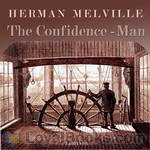 The Confidence-Man: His Masquerade
The Confidence-Man: His Masquerade
The Confidence-Man: His Masquerade was the last major novel by Herman Melville, the American writer and author of Moby-Dick. Published on April 1, 1857 (presumably the exact day of the novel's setting), The Confidence-Man was Melville's tenth major work in eleven years. The novel portrays a Canterbury Tales-style group of steamboat passengers whose interlocking stories are told as they travel down the Mississippi River toward New Orleans. The novel is written as cultural satire, allegory, and metaphysical treatise, dealing with themes of sincerity, identity, morality, religiosity, economic materialism, irony, and cynicism... | |
By: Irvin S. Cobb (1876-1944) | |
|---|---|
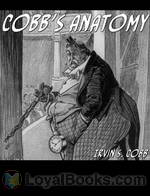 Cobb's Anatomy
Cobb's Anatomy
Irvin Shrewsbury Cobb was born on June 23, 1876. At seventeen years of age, he began writing for the Paducah Daily News, his hometown paper. At nineteen he became the managing editor; up to that point, our nation’s youngest. He worked as a columnist, a humorist and an author. But ‘horror,’ and ’short stories,’ are not why he is remembered. He is remembered because he was, and still is, funny. And although he is now dead–he died March 11, 1944–this work “Cobb’s Anatomy,” among others, has left an indelible mark upon mankind: a smile. | |
By: Israel Zangwill (1864-1926) | |
|---|---|
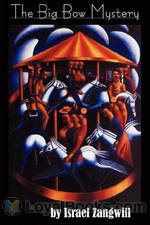 The Big Bow Mystery
The Big Bow Mystery
Regarded as the first full-length locked room mystery, the novel focuses on a murder that has occurred inside a locked room, with no clear indication as to the weapon used, the perpetrator of the horrendous crime, or a possible escape route. Needless to say, The Big Bow Mystery has all the elements necessary to engage its audience and encourage them to look between the lines in an attempt to unravel the complex murder. Set in Bow, east London, the novel opens when Mrs. Drabdump, a widow who rents out rooms, panics when one of her lodgers does not respond to her fervent attempts to wake him... | |
By: Ivan Goncharov (1812-1891) | |
|---|---|
 Oblomov
Oblomov
Oblomov is the best known novel by Russian writer Ivan Goncharov, first published in 1859. Oblomov is also the central character of the novel, often seen as the ultimate incarnation of the superfluous man, a symbolic character in 19th-century Russian literature. Oblomov is a young, generous nobleman who seems incapable of making important decisions or undertaking any significant actions. Spoiled as a child to the point of not even being able to put on his own socks, Oblomov is unprepared to deal with the smallest difficulty of adult life... | |
 Common Story
Common Story
Alexander Fedoritch Adouev is the naïve, pampered son of Anna Pavlovna, a provincial landowner. He decides to go off to Saint Petersburg, not only to make his mark upon society but also to fulfill his two rosy romantic dreams of becoming a great writer and finding a great love. He is taken under the reluctant wing of his uncle, Piotr Ivanitch Adouev, a pragmatic, hard-headed businessman who scorns everything romantic and tries to cure Alexander Fedoritch of his sentimental, youthful illusions. The... | |
By: J. M. Barrie (1860-1937) | |
|---|---|
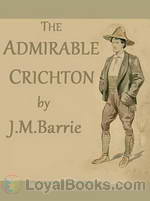 The Admirable Crichton
The Admirable Crichton
From the author of Peter Pan:Lord Loam, a British peer, considers class divisions to be artificial. He promotes his views during tea-parties where servants mingle with his aristocratic guests, to the embarrassment of all. Crichton, his butler, particularly disapproves of this.Loam, his family, a maid, and Crichton are shipwrecked on a deserted tropical island. The resourceful Crichton is the only one of the party with any practical knowledge. Eventually, social roles are reversed, and Crichton becomes the governor. | |
By: James De Mille (1833-1880) | |
|---|---|
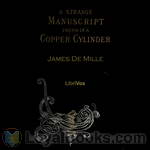 A Strange Manuscript Found in a Copper Cylinder
A Strange Manuscript Found in a Copper Cylinder
A Strange Manuscript Found in a Copper Cylinder is the most popular of James De Mille’s works. It was serialized posthumously in Harper’s Weekly, and published in book form by Harper and Brothers of New York City in 1888. This satirical romance is the story of Adam More, a British sailor. Shipwrecked in Antarctica, he stumbles upon a tropical lost world of prehistoric animals, plants, and a cult of death-worshipping primitives. He also finds a highly developed human society which has reversed the values of Victorian society... | |
By: James Thomson (1834-1882) | |
|---|---|
 Satires and Profanities
Satires and Profanities
"Believing as I do that James Thomson is, since Shelley, the most brilliant genius who has wielded a pen in the service of Freethought, I take a natural pride and pleasure in rescuing the following articles from burial in the great mausoleum of the periodical press. There will doubtless be a diversity of opinion as to their value. One critic, for instance, has called “The Story of a Famous Old Jewish Firm” a witless squib; but, on the other hand, the late Professor Clifford considered it a piece of exquisite mordant satire worthy of Swift... | |
By: Jane Austen (1775-1817) | |
|---|---|
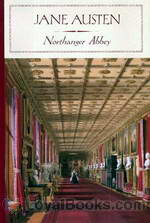 Northanger Abbey
Northanger Abbey
Jane Austen’s Northanger Abbey is a book about the life of Catherine Morland and her romantic relationships. The novel is divided into two parts; the first part begins with Catherine’s visit to Bath and her relationship with Henry Tilney and the other people she met there, and the second part starts with the arrival of Frederick Tilney and her visit to Northanger Abbey. This book alongside Pride and Prejudice and Sense and Sensibility is considered one of the major works of Jane Austen. The novel had undergone many revisions before its publication and it was even originally titled “Catherine... | |
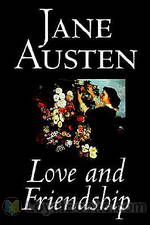 Love and Friendship
Love and Friendship
Begun when she was just eleven years old, Love and Friendship is one of Jane Austen's stories that very few readers may have encountered before. Austen experts feel that this story was written, like many others, only for the pleasure of her family and friends. It is scribbled across three notebooks, in childish handwriting, and the complete work is thought to have been written over a period of six or seven years. It is dedicated to one of her cousins, whom she was very close to, Eliza de Feuillide... | |
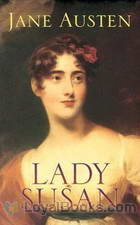 Lady Susan
Lady Susan
An epistolary novel, Lady Susan is an early work by Austen that was posthumously published in 1871. The short novel focuses on the self-serving eponymous anti-heroine, as she cunningly maneuvers her way through society in search of a wealthy husband for both her daughter and herself. Disregarding anything but her own selfish goals, Susan employs her charms to lure men and draw them into her web of deceit, no matter their age or status. Exploring issues including morals, manners, self-indulgence, malevolence, and social machinations, the relatively short novel is sure to fascinate with its atypical form... | |